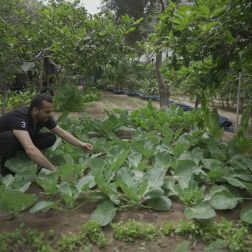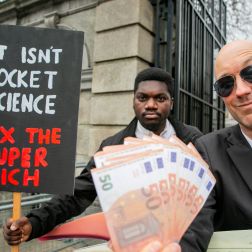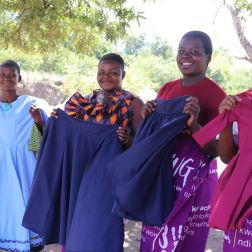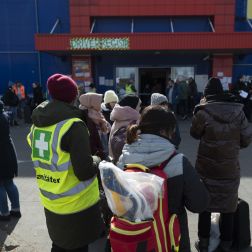- 7 mins read time
- Published: 23rd August 2019
The Rohingya crisis: a matter of life and death
On 25 August 2017, the Myanmar military began a brutal crackdown on Rohingya communities causing more than 700,000 people to flee to Bangladesh. Since then, refugees having been living in camps and Bangladesh communities with little hope for the future. Refugee and Bangladeshi communities are intertwined, and harmony between them is essential for the security and peace of mind. Elizabeth Hallinan, Oxfam’s Advocacy Manager in the Rohingya crisis explains why we must move beyond the emergency response in Bangladesh and give people better infrastructure and the chance to earn and learn.
For over a year, I have been working in the Rohingya camps in Cox’s Bazar where I have seen the refugee and host communities settle into a life together. One member of the Bangladeshi host community with a keen sense of history is Abu Jahed from the Teknaf area. His life story demonstrates the intertwined histories of Rakhine and Cox’s Bazar.

Abu Jahed at his home in the Teknaf area. Photo credit: Mutasim Billah/Oxfam
Situated between the Bay of Bengal to the west and the Naf River to the east, Teknaf is a peninusula with paddy fields and river embankments from where you can see beyond to the high green hills of Myanmar. Two years ago, Bangladeshi villagers watched smoke rising from these hills and prepared themselves for the new arrivals.
Safety in Bangladesh
Abu Jahed remembers those early days: “We could see the smoke of their burning houses from here. They came, crossing the river – can you see how big that river is to cross? Many of them died doing so. Those that made it here had nothing – no food, no water, and barely dressed. I went to the main road to invite them to my house.”
This was not the first time refugees from Myanmar braved the Naf River to arrive here. The Government of Bangladesh currently hosts more than 912,000 refugees (https://data2.unhcr.org/en/documents/download/70585): about 710,000 of whom came in 2017, but about 200,000 have been here longer, since conflict in the late 1990s and early 2000s. Refugees have come to Bangladesh, searching for safety, about a dozen times since Myanmar became a country in 1948.
The fight over natural resources
Like many places in Teknaf, refugees landing in Abu Jahed’s village, arrived quite literally in the host community’s backyards. They put up shelters in paddy fields, chopped down precious jungle forest, crowded the water pumps.
“We, the local people, are dependent on three things – the forest, the land and the river. These people have chopped down our forest, they have taken our land, and now even the army does not let us cross the river for fishing and trade. You can see why people say that the Rohingya took everything from us. In no time at all, we were quarrelling.”
Poverty and limited social services
Cox’s Bazar is the second poorest district in Bangladesh; the host community was struggling even before the latest arrivals. There are about 335,000 Bangladeshis, and nearly three times that many refugees. The strain is undeniable.
I asked Abu Jahed why he decided to take people in?
“Let me tell you something about me,” he says. “In 1971, during the Bangladesh Liberation War, I myself was a refugee in Myanmar. I was 10 years old when we woke in the night to find our houses burning, and we made the awful journey to Myanmar to save our lives. People there took us in. We had nothing, but we were safe there.
“To this day, we are very thankful to them and now feel a responsibility to pay them back for this kindness.”
Repaying the kindness
Many host community members have expressed this kind of sentiment to me. Some were themselves displaced in the 1970s, others felt a bond with fellow Muslims or said that helping the refugees just seemed like the right thing to do. While many local community members expressed empathy for the refugees, they also see that the sheer scale of the new population is a larger issue.
Abu Jahed put it like this: “Let me tell you a story… Some boys were playing by a river where some frogs were floating. The boys started throwing stones at the frogs, when a passing village elder asked the boys what they were doing. ‘We are playing,’ they answered. Listening to the boys’ reply, the frogs called out, ‘Throwing stones at us might be a game for you, but our lives are at risk.’ The Rohingya people and the people of Cox’s Bazar are like the frogs of the story. The world is playing with us. This situation is a game for them, but for the hosts and the refugees living in these conditions it is a matter of life and death.”
Refugees need legal status
Refugees in Bangladesh do not have legal status, so they cannot work, move freely around the country or access a formal education.
This presents a huge problem, explained Abu Jahed: “It is undeniable that education is a must for everyone. If the government can find a way to support their education without causing more problems for us, everyone could support that. Otherwise, what can we expect of the next generation growing up in conditions where their rights are violated, and they have no proper education? We can’t expect anything good.”
International support is urgent
The Government of Bangladesh is under a huge amount of pressure to provide for the refugee population, while also managing the legitimate frustrations of the local communities hosting them.
It is a delicate line to walk, and Bangladesh needs support from countries around the world to continue to develop Cox’s Bazar. For 2019, the response has only 36% of the funding it needs to help these communities [https://fts.unocha.org/appeals/719/summary].
Myanmar also needs to take steps to address the root causes of the conflict. It must implement the Rakhine Advisory Commission Recommendations, including equal access to to citizenship for Rohingya while putting an end to movement restrictions and other discriminatory policies [http://www.rakhinecommission.org/the-final-report/].
Listen to the people
Abu Jahed told me, “I would urge our government and other countries to put pressure on Myanmar, so that they stop this and listen to what Rohingya people want to say. They are asking for their citizenship, nothing else. If Myanmar does not listen then the world should come forward to help Bangladesh.
“Remember the story I shared? It might be a game for them, but we are risking our lives.”
Oxfam has been working with Rohingya refugees since the beginning of the crisis. We have supported more than 266,000 people, providing them with clean drinking water, latrines, sanitation and hygiene, fresh food vouchers, lighting, and protection programs. Oxfam also works with host communities providing protection and livelihood opportunities. We advocate at the highest levels for the rights of refugees in Bangladesh and communities impacted by conflict in Myanmar. Oxfam will continue to support refugees, working with national and international partners, to ensure that everyone’s rights are respected and that they have access to basic services while working towards durable solutions to this crisis.




